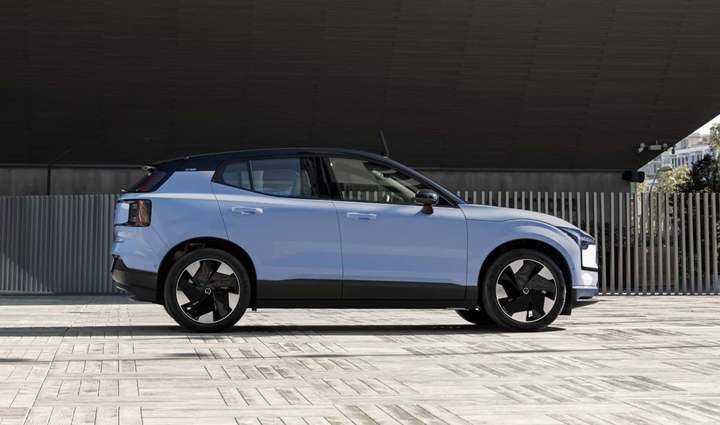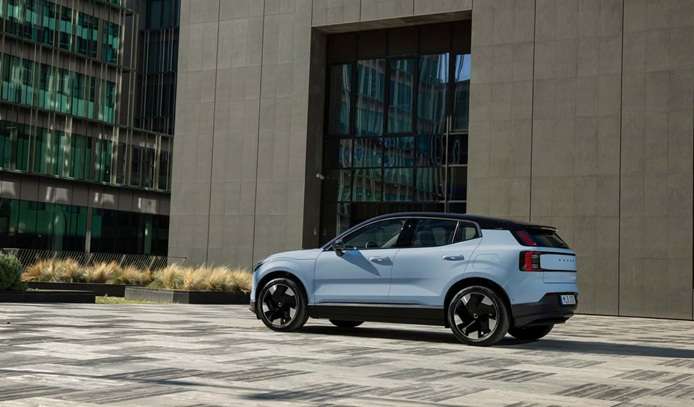When Volvo first announced the all-electric EX30 SUV would start at just $34,950, it sent waves of excitement through the EV world. An upscale, European-designed compact electric SUV under $35K? It seemed like a dream deal for American drivers looking for a stylish, affordable, eco-friendly ride. But just months later, that dream is starting to unravel — not because of battery shortages or production delays, but due to rising tariffs and trade tension. And according to Volvo’s CEO, the EX30’s American future may now hang in the balance.

The Volvo EX30 was positioned as a game-changer: sleek Scandinavian design, practical size, solid range, and premium features — all at a price tag that made it competitive with mass-market models like the Hyundai Kona Electric or Chevy Bolt EUV. But what Volvo didn’t anticipate was a wave of new U.S. tariffs aimed at imported electric vehicles, particularly those made in China or the European Union. Originally, Volvo planned to export the EX30 to the U.S. from its factory in China. However, after the Biden administration imposed a 100% tariff on Chinese-made EVs, that plan was scrapped.
Volvo quickly pivoted, investing in ramping up production at its plant in Belgium — a solution that seemed viable until the U.S. announced an additional 25% tariff on all imported vehicles, regardless of origin. And it could get even worse. Donald Trump has suggested raising EU tariffs to 50% if re-elected. Volvo’s leadership is now openly saying what many in the auto industry are thinking: bringing the EX30 to the U.S. under these conditions could become financially unworkable.
Tariffs = Higher Prices
Volvo CEO Jim Rowan (corrected from original Håkan Samuelsson) didn’t sugarcoat it. He told Reuters that passing such steep tariff costs onto consumers would almost certainly price the EX30 out of its original budget-friendly range. And it’s not just about Volvo. He pointed out that automakers don’t operate with fat profit margins — 6% is considered solid. If costs rise by 25–50% due to tariffs, carmakers simply don’t have the room to absorb that hit. That leaves them with two options:
- Raise prices, which pushes affordable EVs out of reach for many Americans.
- Stop importing certain models altogether, shrinking consumer choices and reducing competition.
Either way, American drivers lose — especially those hoping for more accessible electric vehicle options in the near future.
These tariff moves may be aimed at protecting domestic industries, but there’s growing concern they’ll end up hurting more than helping in the short term. Even U.S. automakers aren’t cheering these new trade policies. Legacy carmakers like Ford and GM are already struggling to keep up with the pace of innovation and affordability coming from Chinese automakers like BYD and Geely (Volvo’s parent company).
By making it harder and more expensive for global brands like Volvo, BMW, Hyundai, or Kia to compete in the U.S., tariffs could unintentionally give Chinese companies a bigger lead in the global EV race. Plus, there’s the geopolitical risk: the European Union could retaliate, adding its own tariffs on U.S. goods — potentially creating a trade war that hurts multiple industries.
If you’ve been watching the EV market, hoping for a stylish, high-quality, affordable electric SUV, the Volvo EX30 might’ve been your perfect match. But the new reality is this:
- The EX30’s price is likely going up, possibly above $40,000.
- Import delays or cancellations could make it unavailable in the U.S.
- Other affordable EV options from abroad could face similar challenges.
In a time when many Americans are looking to switch to electric vehicles for fuel savings, sustainability, or tech features, these tariff battles might actually limit those choices — not expand them.

Volvo’s leadership isn’t completely pessimistic. Rowan says he still believes the U.S. and EU will reach a mutual trade agreement soon, as neither side benefits from a prolonged standoff that limits automotive trade. There’s also room for a smarter, phased strategy that encourages domestic EV production over time without pulling the rug out from global automakers already operating in the U.S. market. But for now, uncertainty rules — and the EX30 is caught in the middle.
The Volvo EX30 was supposed to be a breakthrough in affordable electric driving. But new tariffs have made what was once a bold, promising plan feel like an uphill battle. If trade tensions continue and steep tariffs stick, we may be entering a new era of high-priced EVs, with fewer options and slower progress. Let’s hope policy makers and industry leaders can find a balance — because a future filled with more clean, affordable electric cars shouldn’t feel like a distant dream.
Related Post
